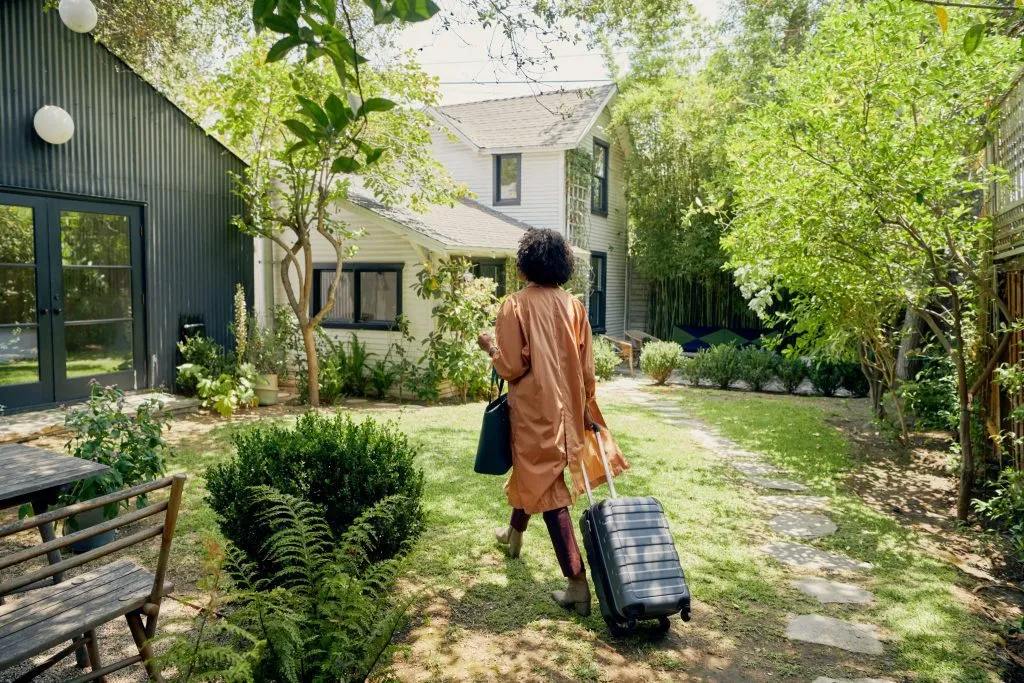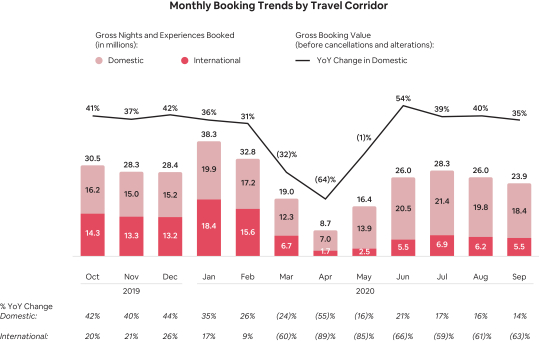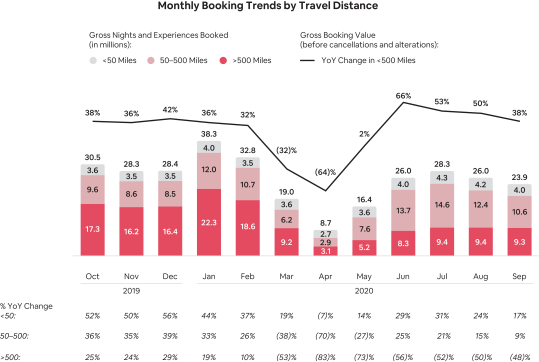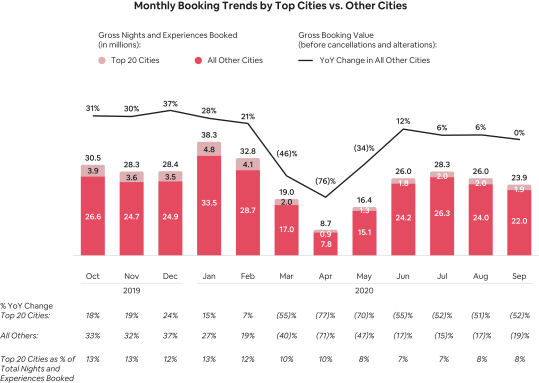How Domestic Travel & Long-Term Stays Saved Airbnb in Pandemic Era

Skift Take
From the fresh-off-the-press Airbnb IPO S-1 filing, a first look at how a resurgence in domestic travel really saved one of the hottest companies in travel in a year where almost everything in travel shut down.
From its filing, this extract below on domestic bookings for Airbnb:
"Against an otherwise highly negative travel backdrop, there are several areas of our business that have shown resilience, notably, domestic travel, short-distance travel, travel outside of our top 20 cities, and long-term stays. While we believe that travel will change as a result of COVID-19, the adaptability of our business suggests that we are well-positioned to serve this dynamic market as it continues to evolve and recover.
To provide additional information on the impact of the COVID-19 pandemic on our business, we have included below year-over-year comparisons of monthly booking trends in the fourth quarter of 2019 and the first nine months of 2020.
For more on Airbnb's IPO in our ongoing coverage, check our stories here.
Domestic travel represents travel within the same country, when the guest’s origin country is the same as the destination country. Our business historically has been weighted toward cross-border travel, which accounted for 49% of nights in 2019 relative to our estimate for the travel industry that 20% of total overnight paid trips come from cross-border travel. While air and cross-border international travel has been significantly impacted by COVID-19, domestic travel around the world has been extremely resilient. In September 2020, global domestic nights and experiences booked were 77% of our gross nights and experiences booked compared to 52% in January 2020, and domestic nights and experiences grew 14% year-over-year. Taking into account the higher daily rate during this period, domestic Gross Booking Value before cancellations and alterations grew 35% year over year in September 2020.

Short-distance travel within 50 miles of guest origin has been highly resilient, even at the peak of the business interruption in April. Short-distance stays were one of the fastest growing categories prior to the COVID-19 pandemic. This growth was further bolstered by the COVID-19 pandemic, as many guests chose short-distance trips instead of long-distance travel. From May through September 2020, this category grew year over year. We have also seen stays between 50 miles and 500 miles from guest origin recover and return to year-over-year growth since June 2020. Taking into account the higher gross daily rate during this period, Gross Booking Value before cancellations and alterations for travel distance under 500 miles grew 38% year over year in September 2020.

Travel outside of our top 20 cities (based on 2019 GBV) has been more resilient than those booked in our top 20 cities. While gross nights and experiences booked in our top 20 cities by 2019 GBV were down 52% in September 2020 compared to September 2019, those booked outside of our top 20 cities based on 2019 GBV were down only 19%. Taking into account the higher gross daily rate during this period, Gross Booking Value before cancellations and alterations for travel booked outside of our top 20 cities was flat year over year in September 2020. During a period of travel restrictions, community lockdowns and social distancing, smaller destinations have seen relative strength, as guests seek more remote destinations outside crowded urban centers. We believe this demonstrates the strength of our global network and the diversification of our business.

Long-term stays are stays on our platform of at least 28 nights. Long-term stays were one of our fastest growing categories in 2019 as guests increasingly chose Airbnb listings to meet their need for stays of greater length. We believe the long-term stays category represents a different use case than leisure travel, and as a result, was not as impacted as dramatically by COVID-19. While the category of one to 27 nights (short-term stays) was down 81% year over year in April, long-term stays were down only 13% year over year and saw year-over-year growth from May through September 2020. Taking into account the higher gross daily rate during this period, Gross Booking Value before cancellations and alterations for long-term stays was up 50% year over year in September 2020.

Overall, the historical mix of gross nights and experiences booked by travel distance, corridor, and top 20 cities is similar to the historical mix of revenue by those categories. Because long-term stays have lower GBV per night and lower service fees, the revenue by trip length is weighted more toward short-term stays."
For more on Airbnb's IPO in our ongoing coverage, check our stories here.





